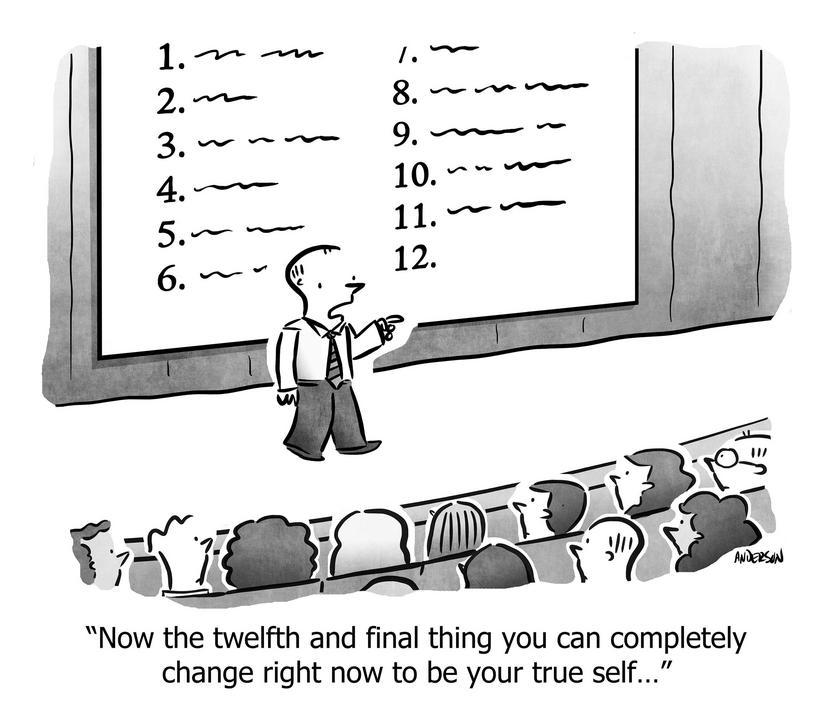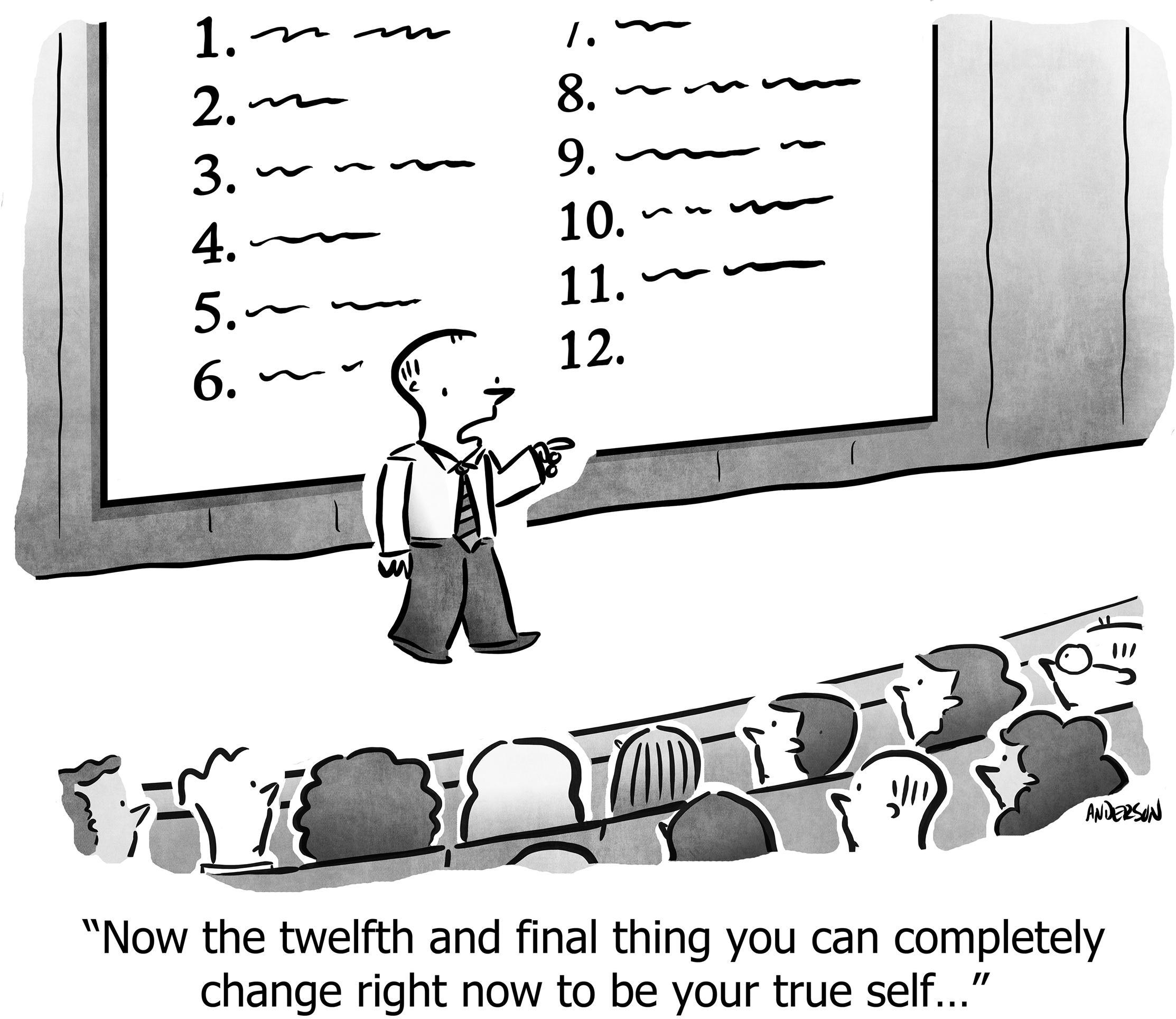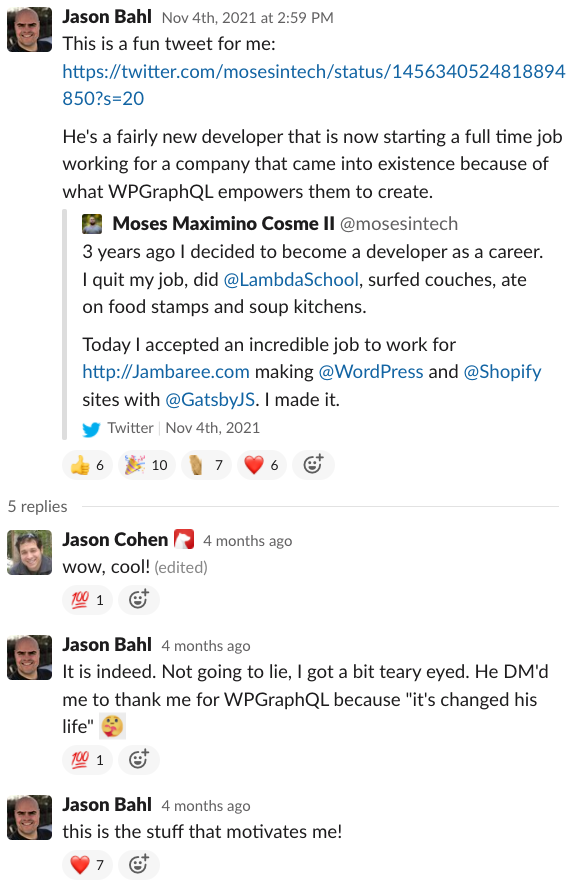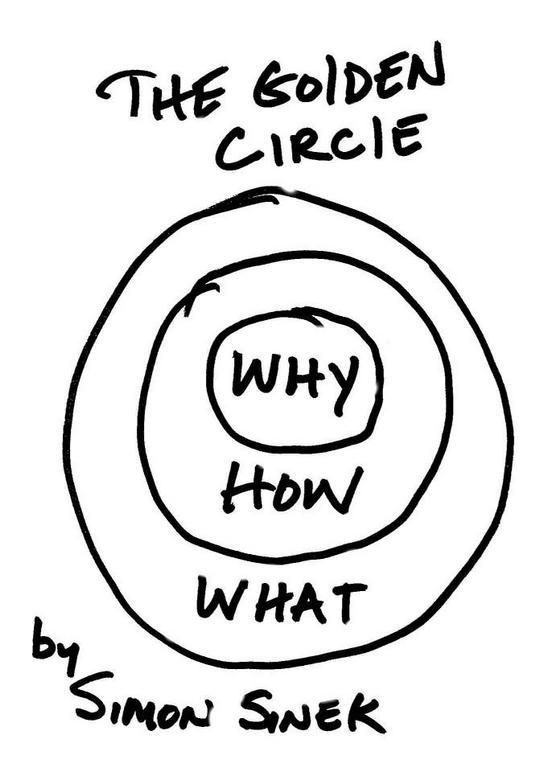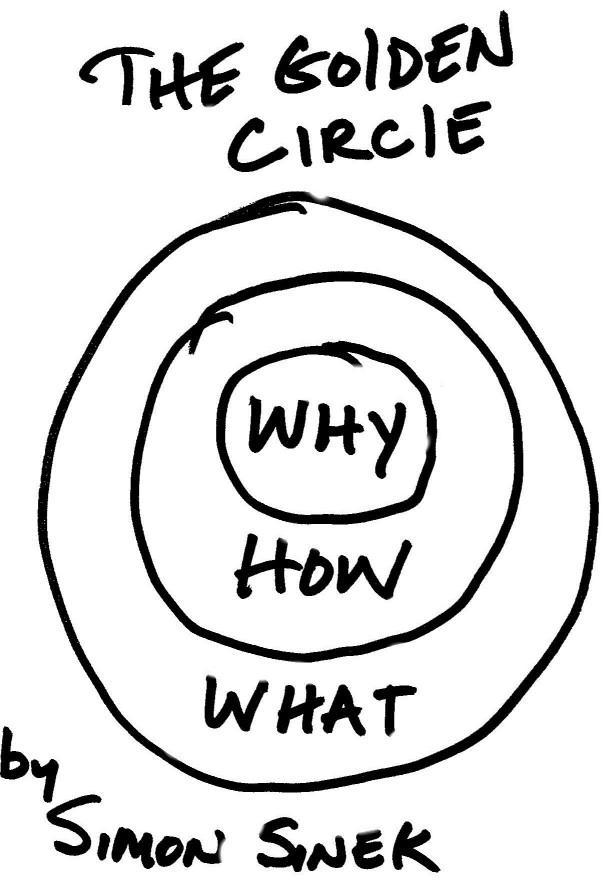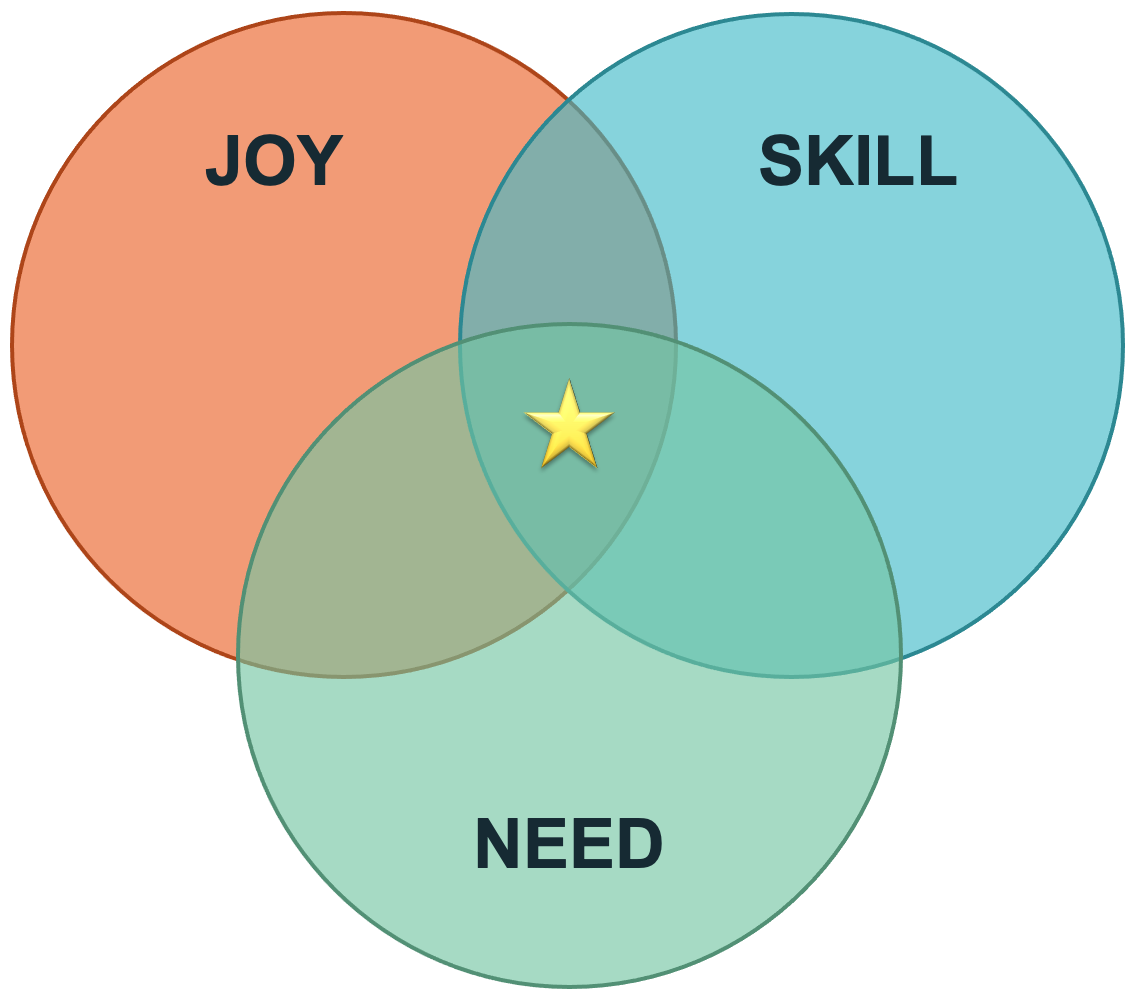Finding Fulfillment
Many blogs, resulting in book deals, resulting in speaking careers, have been forged by taking a swing at a basic human question:
What creates a fulfilling existence?
Managers desperately ask, forced by the Great Resignation to acknowledge that people are more mobile than expected when sufficiently (un)motivated.1 Enlightened leaders ask proactively, because intrinsically-motivated people do great work that is just as fulfilling for themselves as it is productive for the company—capitalism on its best day. Outwardly-impenetrable leaders ask it of themselves to conquer burn-out or to decide what to do with the balance of life that follows the societal definition of “success.”
1 Your best talent are volunteers—they can always walk across the (now virtual) street for more money, because they’re worth it, and because their resume has been incrementally improved by the experience at your company. You may protest that the grass isn’t greener over there, but rather their feelings arise from the modern malaise instigated by COVID-imposed isolation from genuine relationships and the vile so-called online “relationships” fueled by toxic politics. You might even be right, but it’s too late.
What follows is my original framework I used to answer this question for myself ten years ago when I made the decision to step aside as CEO of the (now unicorn) company I founded. I still use it myself and recommend it to others.
First, some of the best prior art on the topic.
Pink’s Motivation: Autonomy, Mastery, Purpose
Daniel Pink famously surmised2 that “carrots and sticks” are poor motivators for most people. Worse, they’re demonstrably counter-productive in common real-world scenarios. Instead of external motivators, blatantly designed for the benefit of the organization rather than the individual, people prefer—people deserve—to be driven by internal motivation, aligned with genuine personal fulfillment.
2 in his book, though you might prefer to watch his extremely popular TED talk
My subjective experience confirms this science-backed insight. The best people don’t have to settle for anything less than personal fulfillment at work, as evidenced by the Great Resignation. And anyway it results in an organization that we are all proud to build.
Pink suggests that internal motivation arises under three conditions:
- Autonomy
- People are fulfilled when they decide what to do and how to do it. Counter-examples include micro-management, inflexible working conditions, and one-way command-and-control structures. Positive examples include self-managed scrum teams, work-from-anywhere-and-whenever schedules, and agreeing on the goals of the final product rather than dictating the details of what that product is and how it must be created.
- Mastery
- Great people want the opportunity to do great work. They want to be around other people who are doing the same. Experts enjoy deploying their expertise; novices with vim and aptitude enjoy learning and growing.
- Purpose
- As the janitor famously answered in 1962 when president Kennedy asked him what he did for NASA, “I’m helping put a man on the moon.” Everyone—not just Gen Z—wants to be a part of something bigger than themselves. That could be a noble cause, or something more incremental but tangible, like genuinely helping another human being in their own endeavors, as one might do in a world-class customer service organization.
Other work agrees with and extends these ideas.3 However, I believe that to leap from Pink’s original question—*What motivates people?*—to my question—*What is fulfilling?*—at least one vital component is missing: Joy.
3 For example, Self-Determination Theory asserts that motivation arises from “autonomy, competence, and relatedness”—essentially the same thing.
生き甲斐: A reason to be alive
For thousands of years the Japanese have revered those who devote their lives to the mastering of a craft, having “craftsman spirit” 職人気質 (shokunin kishitsu). The samurai and the flower-arranger hold equal value, the chef and the janitor hold equal prestige, when each are whole-hearted in their endeavors. Furthermore, world-class skill is only half of the meaning of being a shokunin; you must also play a mindful and intentional role in bettering the community.
It is not only “Mastery” but also “Purpose.” The Japanese have venerated 2/3rds of Pink’s trifecta for millennia.
An equally ancient concept, that received a direct name in the 1960s, is 生き甲斐 (ikigai)—a motivating force that gives someone a reason for living:
… ikigai … usually means the feeling of accomplishment and fulfillment that follows when people pursue their passions. Activities that generate the feeling of ikigai are not forced on an individual; they are perceived as being spontaneous and undertaken willingly, and thus are personal and depend on a person’s inner self. ( Wikipedia)
This adds color to the idea of intrinsic motivation as well as that of extrinsic purpose. Furthermore, it’s not an exaggeration to say that this is a reason to go on living at all:
National Geographic reporter Dan Buettner suggested ikigai may be one of the reasons for the longevity of the people of Okinawa. According to Buettner, Okinawans have less desire to retire, as people continue to do their favourite job as long as they remain healthy. “Moai”, the close-knit friend group, is considered an important reason for the people of Okinawa to live long. In 2016, [Héctor García and Francesc Miralles published] a book based on this concept: Ikigai: The Japanese Secret to a Long and Happy Life. ( Wikipedia)
We need purpose, whether it’s the Silicon Valley notion of “changing the world” or to be a great-grand-parent. To be useful, to be needed, even to be wanted, one person to another, is already a higher purpose.
One person at a time, can be all it takes, as in this serendipitous Slack exchange I had with WPGraphQL founder Jason Bahl:
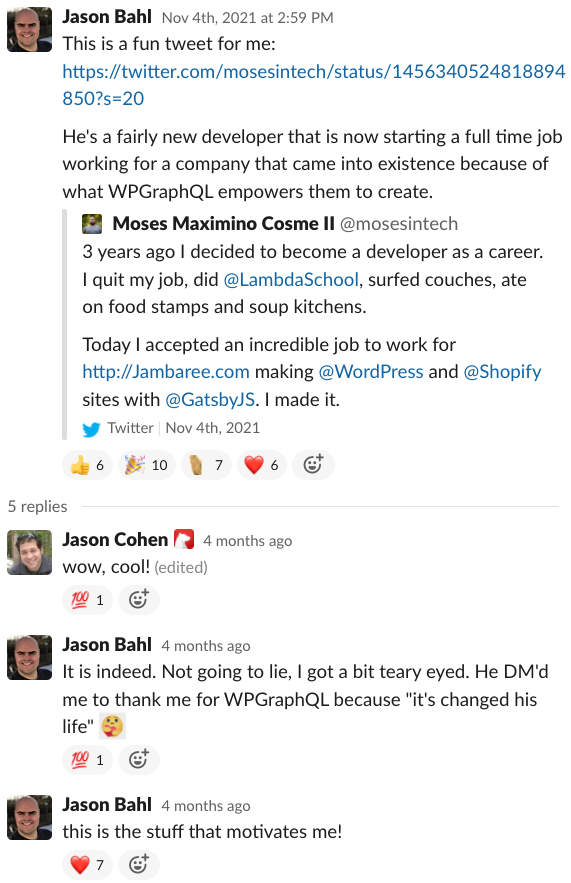
Figure 1: (reprinted with permission)
A “higher purpose” might elicit an eye-roll from the skeptic, but it turns out to be useful even if you’re a cold-blooded, mercenary, even authoritarian-style leader.
Sinek’s Fanaticism: Start with why
Simon Sinek wanted to know why some organizations produce fanatics. Not just customers and employees, not just people who like and buy the products, but people who personally identify with the company, incorporating the company’s brand into their personal brand. When competitors build something objectively better, they don’t switch, because for them it’s not just about the features and the price. They’d work for that company if they could, and many do. As a result, employee turnover is low and productivity is high. Therefore every aspect of the business is stronger. How does this arise?
Sinek sums up the answer: These companies Start with “Why.” Meaning: These organizations have clear, simple, compelling raison d’être, a reason for being, something they stand for, something they would never contravene with their actions, even if it hurts sales or profitability.
It could be a “higher purpose,” like Patagonia’s incontrovertible mission to save the Earth,4 or SpaceX’s mission to make humanity a multi-planetary species, or the Gates Foundation project to save millions of lives by eradicating malaria.
4 Beyond the obvious—sustainable practices, an outdoor-worshiping culture—they have a formal company policy to bail employees out of jail if arrested while protesting peacefully.
But it doesn’t have to be grandiose or holy to be motivating. Sinek frequently returns to the example of Apple’s “Think Different” campaign; this taps the personal brand of those who are (or want to be seen as) independently-minded, creative, creators, iconoclasts, and artists, including artists embedded in fields like software development and engineering. Or Salesforce with its “ 1-1-1” or WP Engine with its “ Engine for Good”—thoughtful, systematic ways of giving back to the communities they are a part of (without pretending to single-handedly “change the world”). Or Rackspace with their “fanatical support,” transforming the traditional status of Customer Service from a begrudged cost-center hell-bent on cost-reduction, elevating it instead into the honor of serving others, and a critical product differentiator in a market that is otherwise commoditized.
When people are financially invested, they want a return. When people are emotionally invested, they want to contribute.
—Simon Sinek
All of these companies were created by and are still run by Gen-X-and-older. So, wanting a higher purpose isn’t just “a Gen Z thing,” though clearly younger generations do, on average, talk about this more, and more conscientiously. In any case, the freshest talent and the future leaders of the world are Gen Z, so even a leader unsympathetic to “causes” should realize that having a higher purpose is more useful than not having one.
This confirms and clarifies the “Purpose” component of the Pink Trifecta. Sinek approached it from an analysis of fanaticism and loyalty to organizations, and arrived at the same place.
Cohen’s Circles & Traps: Joy, Skill, Need
It is possible to be empowered to work how you want (Autonomy), to be leveraging your skills and expertise (Mastery), and to be proud of your role in a cause (Purpose / Why), and yet still dislike every day of your existence. More than contentment (ikigai), you need Joy.
Not only is this possible, it is common. There’s the classic example of the startup founder who wakes up six years into the journey, realizing she’s been surreptitiously brought to a boil, burned out, dreading each day, drinking too much “to turn my brain off so I can sleep” but actually because she’s deeply unhappy:
Each morning for the past couple months, my first thought has been “What could today be like if I didn’t work here?” I drift off into exploring what it would be like to work at WalMart, or the construction site outside, or as a grocery store bagger. It seems so stress free. This morning, I locked myself in the bathroom with the shower running (don’t want wife to know) and cried my eyes out. I haven’t cried in many years. It felt great, but only for an hour.
— Anonymous founder
Eight years ago I created my own framework for understanding how I could avoid this burn-out trap at WP Engine,5 especially when making decisions that are contrary to ego. The ego says “Being the CEO is the best.” Silicon Valley says “The founder being the CEO is the Only Way.”6 So it’s hard to convince the ego to let go of being the CEO, as I did at WP Engine, even if being the CEO creates unhappiness.
5 Whereas I did burn out at my previous company Smart Bear. Even selling the business didn’t immediately fix the problem, although it was the beginning of the answer.
6 Typically citing Apple, Facebook, and Amazon while ignoring counter-examples like Google, LinkedIn, and Intel, although there do exist thoughtful arguments that embrace those exceptions.
Here’s the insight: Not only do you need all three of the following components, but any two alone create a specific trap:
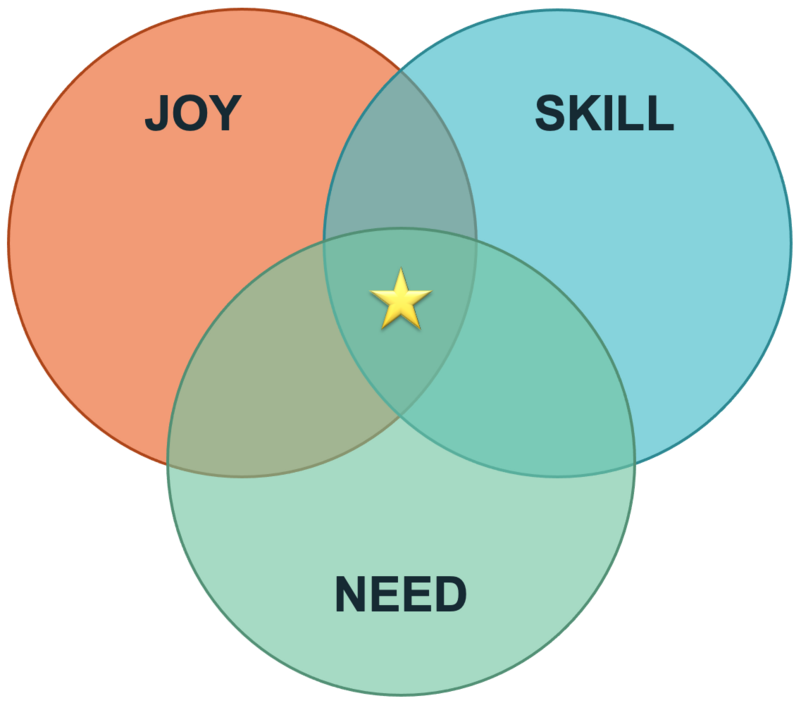
Figure 2: Someday I’ll make a Venn diagram where “the middle” isn’t the answer, but today is not that day.
- Joy
- You love doing it. When you do it all day, you forget to eat and pee. At the end of a long day of doing it, you still want to do it.
- Skill
- You’re great at it. Your work is so good, even you are proud of it. It stands out, and others notice. Those who don’t understand how much effort you expended say: “You’re a natural.”
- Need
- The company needs it done. It’s a top-three priority. Doing it well means a critical part of your strategy will succeed. Not doing it is crippling.
Having any two without the third creates a well-defined yet common trap. It’s instructive to understand the traps, because it can feel good to be in the trap:
- Trap: Joy + Skill − Need = Useless Flow
- At the intersection of Joy and Skill is “being in the zone,” a.k.a. Flow.7 Wonderful! Unless you’re working on something the company doesn’t need done. Being in flow is intoxicating, and does “recharge the batteries,” but it’s unproductive. Continuing the example of the burned-out founder living in this trap, there’s no one willing or able to tell you to your face that you’re not contributing to what the company needs, so you stay in your happy place. A classic example is the technical founder writing code instead of making sales, fixing the website, handling the accounting, or hiring the next great team member.
- Trap: Joy + Need − Skill = Indulgent Failure
- The company needs to begin advertising. You’ve never done AdWords before, but you always wanted to try it, and anyway it’d be fun to learn something new. You might hire someone to do it later, but not now, because how do you hire and manage someone else without understanding the job yourself? So you make the AdWords campaigns. And since you’re unskilled at both marketing and AdWords, you waste three months. You might even erroneously conclude “AdWords doesn’t work” because that’s an easier conclusion than “I don’t know what I’m doing.” If the company needed advertising so badly, you did a disservice to the company by indulging your desire to “play with it,” because now months have passed without accomplishing what needed to be done. You tell yourself that now you can hire that person, because three months of flailing somehow makes you an “expert.” As founder, no one will contradict you, so you indulge, and the company falls that much further behind.
- Trap: Skill + Need − Joy = Burn-out
- This is classic burn-out. When you do the work all day, you feel drained and exhausted rather than energized (as you would if it were Flow = Skill + Joy). You do the work, because the company needs it done. You do the work, because you are undeniably great at it. Even though you hate doing it, you’d rather take it on yourself rather than foist it on others, whether because you want to “protect them from the drudgery,”8 or because you believe they can’t do as good a job as you can, or because you can’t afford to hire someone. Because you create great results that the company needs, it doesn’t look like a problem—not to you, nor your team. But because you dislike it, you grow to resent it, and eventually you can’t face it, and you’re finished. Many startup founders agree.
7 Flow is when a person is fully immersed in an activity for an extended period of time. Time passes unwittingly, performance is at maximum, and it is universally described as pleasurable.
8 No one wants the boss doing all the drudgery, especially if the boss visibly hates doing it. Some people actually like the thing you hate, and you’re preventing them—and you—from being happier.
I created and used this framework nearly a decade ago, to recognize the wisdom of changing roles from the CEO of the company I founded ( WP Engine) to the CTO, so that both our new CEO and I could operate in the center of our Venn diagrams. The thousands of people who have since worked at our company concur that this was a fantastic decision, both personally for the two of us, and for the success of the business, which is now a unicorn and an iconic landmark in Austin, Texas (Figure 3).

Figure 3: Co-winning E&Y’s Central Texas Entrepreneur of the Year Award in 2017 with our inimitable CEO Heather Brunner, who I frequently refer to as “the founder who joined three years in.” Copying how Reid Hoffman describes Jeff Weiner at LinkedIn, it is neither an exaggeration nor an unearned appellation.
This framework is not a replacement of Pink’s model; it is compatible. It adds the missing “Joy” component, while reinforcing “Mastery” with the label of “Skill.” It lacks “Autonomy,” however, perhaps because I created it with the founder in mind—a person who definitionally possesses autonomy, even to their detriment. “Need” is more tactical than “Purpose,” really about being useful.
Therefore, my recommendation is to identify that higher purpose, as described by “Start with Why” or ikigai, and fulfill your own part in that purpose at the center of the three circles.
When we intentionally create a work environment where others have a chance at fulfillment, we’re already improving the world substantially. When we care enough about others to find out what fulfills them, we can help that materialize. When we’re closer to our own center of fulfillment, we can better serve others.
How can you find out who you are, what drives you, what stops you? Here’s the system I’ve used for myself and others, as well as how I figure out “who we are” as a whole product or company.
I wish you luck on your journey!
Thank you to Jason Evanish for providing feedback on earlier drafts.
https://longform.asmartbear.com/fulfillment/
© 2007-2025 Jason Cohen
 @asmartbear
@asmartbear Simple eReader (Kindle)
Simple eReader (Kindle)
 Rich eReader (Apple)
Rich eReader (Apple)
 Printable PDF
Printable PDF
